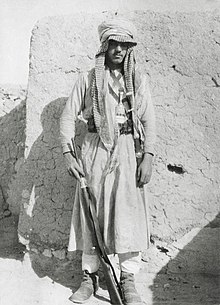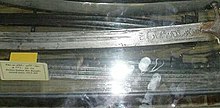Ikhwan
The Ikhwān (Arabic: الإخوان, romanized: al-ʾIkhwān, the Brethren), commonly known as Ikhwān man Aṭāʿa Allāh (Arabic: إخوان من أطاع الله, Brethren of those who obey God),[a] was a Wahhabi religious militia made up of traditionally nomadic tribesmen which formed a significant military force of the ruler Ibn Saud and played an important role in establishing him as ruler of most of the Arabian Peninsula in the unified Kingdom of Saudi Arabia.
They were the product of clergy who aimed to break up the Bedouin tribes and settle them around the wells and oases of the sedentary Arabian populations, mainly those of the Najd, on the grounds that nomadic life was incompatible with the strict conformity of their interpretation of Islam.
[5] According to scholar David Commins, around 1913, the same time that Ibn Saud regained al-Hasa, there emerged in obscure circumstances a zealous movement known as the Ikhwan (Brethren).
[6] The arid, remote region of Najd had been ruled by the House of Saud and religiously dominated by the Islamic revival movement known as Wahhabism (with some exceptions) since the mid-18th century.
Wahhabism was a movement of townspeople, and traditionally thought of the beduin nomadic herders as "bearers of religious ignorance, jahiliyyah, and thus as raw material for conversion".
Unlike nomadic raiders, the Ikhwan earned "notoriety for routinely killing male captives" and for sometimes putting "children and women to death".
[12] With the conquest of the Hejaz in 1925, Ibn Saud had completed his territorial expansion and negotiated border agreements with his neighbors, the British protectorates of Transjordan, Iraq and Kuwait.
[13] After conquest of the two holy cities of Mecca and Medina—which had been part of the Ottoman Empire for four centuries and developed a pluralistic religious culture—Ibn Saud sought to "reassured the Muslim world that a new Saudi regime would not disrupt the pilgrimage",[14] while the Ikhwan "pressed for strict adherence to norms" such as forbidding smoking tobacco and worshiping at shrines.
In 1927 tribesmen of the Mutayr and Ajman rebelled against the ulama's judgment and the authority of Ibn Saud and engaged in cross-border raids into parts of Trans-Jordan, Iraq and Kuwait.
[21] The destruction of an Iraqi police post provoked an international incident by violating the Saudi–Iraqi neutral zone between Iraq and Arabia established by Great Britain and Ibn Sa'ud (1927–28).
The seizure and its aftermath led to the increased power and influence of conservative clerics over Saudi political, cultural and social life, putting an abrupt end to the comparatively moderate outlook (at the time) of the kingdom towards modernization and Westernization.








